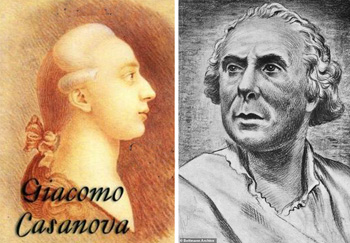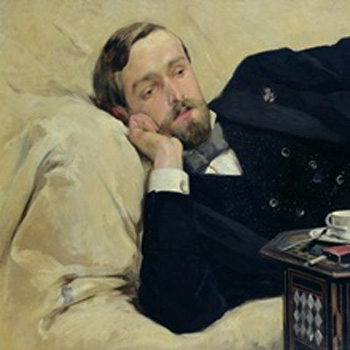Catholic Virtues
 |
 |
 |
 |
 |
 |
 |
True & False Paths to Happiness - XXII
False Absolutes that Lead Man Astray
We have spoken about the true absolute which is God; as would be
predictable, there are also false forms of the absolute.
The 'absolute' of the sensual man
Sensuality is everything for the sensual man. The sensual appetite seeks to satisfy the soul in sensuality, offering it a pseudo-absolute. The sensual does not seek any elevation of soul; rather, the absolute is replaced in his soul by sensuality.
 The sensual individual thinks that, satisfying his appetites, he reaches a certain absolute by means of this type of paroxysm that is sensual ecstasy.
The sensual individual thinks that, satisfying his appetites, he reaches a certain absolute by means of this type of paroxysm that is sensual ecstasy.
This paroxysm, tending to be complete, keeps seeking more and more refinement in that sensual pleasure to give him, at a certain moment, the fullness of enjoyment.
Once I read an article about Casanova, that 18th century Venetian gentleman famous for his amorous adventures, where the author said that people only looked at Casanova under one aspect: the young lover scrambling up a silk ladder to reach the balcony of his beloved lady, who awaited him adorned and perfumed. But no one saw the weariness of Casanova who, after a thousand adventures, unsatisfied and old, was still climbing up balconies in search of a pleasure that he never found.
What was the pleasure that he sought? He wanted to find a woman who would fulfill his desire so completely he would never need anyone else because he would be in full possession of her and the pleasure received from her.
No one sees Casanova after his “Mardi Gras,” but the “Ash Wednesday” of Casanova is a quite true fact.
In the ardent tendency of the human soul to become intoxicated, it somehow perceives that it was made for the infinite because, without the infinite, nothing satisfies it. It is what St. Augustine expressed with the famous phrase: "Thou hast made us for Thyself, O Lord, and our heart is restless until it finds its rest in Thee."
The 'absolute' of the proud
There are two kinds of proud persons: the introvert and the extrovert.
The proud introvert thinks he is a being so elevated that he does not care about the approval of others. The approval of his own judgment is worth much more than the judgment of others. Inside himself is lit the lamp of an inaccessible superiority. Even if others spit upon him, it would be of no import; his head is in the stars while his feet are on the ground.
 This type of proud man immerses himself in the arts, literature, philosophy: a proud theologian, certainly a proud artist. Thus he contemplates himself seeking another form of the infinite, a value so high that he almost divinizes himself.
This type of proud man immerses himself in the arts, literature, philosophy: a proud theologian, certainly a proud artist. Thus he contemplates himself seeking another form of the infinite, a value so high that he almost divinizes himself.
Then, there is the proud extrovert who seeks the applause of the multitude, even if he plagiarizes or copies what others have done, using tricks and artifices, etc. Thus he seeks to make others have an admiration for him so astonishing that it is tantamount to adoration. He seeks to be adored by the others.
In both the introvert and the extrovert there is a phenomenon of a fundamental deficiency that seeks satisfaction in the quest of a certain ecstasy. Such an ecstasy will give the person the impression that he has reached a certain absolute. These are false absolutes.
The 'absolute' of the blasé or indifferent man
The French word blasé is not easy to translate. He is the man tired of life, of everything, even of pleasures. And thus he falls into a state of total indifference to everything.
 Now then, at the root of the man who prevaricates and seeks false absolutes, there is a bipartition, a division. His reason sees that these absolutes are not absolutes, but internally he has an illusory impression that they are absolutes. This bipartition between impression and reason can deceive him into thinking that reason is presenting false things to him. Instead of following reason, he follows that false intuition.
Now then, at the root of the man who prevaricates and seeks false absolutes, there is a bipartition, a division. His reason sees that these absolutes are not absolutes, but internally he has an illusory impression that they are absolutes. This bipartition between impression and reason can deceive him into thinking that reason is presenting false things to him. Instead of following reason, he follows that false intuition.
The blasé man is one who takes these lively impressions as far as he can but never reaches complete ecstasy. From experience, he realizes that this way is wrong, that it will never give him what he thought it would give. He not only sees that ecstasy does not satisfy him completely, but also that it does not contain what he thought it did.
For example, the country man comes to the city thinking he will find something marvelous; afterwards, he sees that the city is not such a marvelous thing. And so, he becomes blasé and, at the same time, addicted to that city life and cannot manage to leave it.
Thus the way of the blasé man is to become attached to something even though he knows that it does not have what he supposed it would have.
The 'absolute' of the lazy
How does the lazy man seek the absolute in laziness? He wants to do nothing, absolutely nothing. For the lazy man the ideal is not just an absence of making an effort to do something, but there is a kind of sin of acedia.(1)
By denying the laws of life, he has little appetite for the things that he should. Feeling himself simply living in idleness gives him a pleasure that suffices. In this he seeks to find the absolute. But instead he finds a frustration, which is, precisely, a punishment.
As one can see, almost all vices have false absolutes.
In the next article we will look at the true absolutes.
To be continued

The 'absolute' of the sensual man
Sensuality is everything for the sensual man. The sensual appetite seeks to satisfy the soul in sensuality, offering it a pseudo-absolute. The sensual does not seek any elevation of soul; rather, the absolute is replaced in his soul by sensuality.

The young Casanova, popular & sought after;
the old, penniless & forsaken
This paroxysm, tending to be complete, keeps seeking more and more refinement in that sensual pleasure to give him, at a certain moment, the fullness of enjoyment.
Once I read an article about Casanova, that 18th century Venetian gentleman famous for his amorous adventures, where the author said that people only looked at Casanova under one aspect: the young lover scrambling up a silk ladder to reach the balcony of his beloved lady, who awaited him adorned and perfumed. But no one saw the weariness of Casanova who, after a thousand adventures, unsatisfied and old, was still climbing up balconies in search of a pleasure that he never found.
What was the pleasure that he sought? He wanted to find a woman who would fulfill his desire so completely he would never need anyone else because he would be in full possession of her and the pleasure received from her.
No one sees Casanova after his “Mardi Gras,” but the “Ash Wednesday” of Casanova is a quite true fact.
In the ardent tendency of the human soul to become intoxicated, it somehow perceives that it was made for the infinite because, without the infinite, nothing satisfies it. It is what St. Augustine expressed with the famous phrase: "Thou hast made us for Thyself, O Lord, and our heart is restless until it finds its rest in Thee."
The 'absolute' of the proud
There are two kinds of proud persons: the introvert and the extrovert.
The proud introvert thinks he is a being so elevated that he does not care about the approval of others. The approval of his own judgment is worth much more than the judgment of others. Inside himself is lit the lamp of an inaccessible superiority. Even if others spit upon him, it would be of no import; his head is in the stars while his feet are on the ground.

The extrovert Salvador Dali & companion at a party
Then, there is the proud extrovert who seeks the applause of the multitude, even if he plagiarizes or copies what others have done, using tricks and artifices, etc. Thus he seeks to make others have an admiration for him so astonishing that it is tantamount to adoration. He seeks to be adored by the others.
In both the introvert and the extrovert there is a phenomenon of a fundamental deficiency that seeks satisfaction in the quest of a certain ecstasy. Such an ecstasy will give the person the impression that he has reached a certain absolute. These are false absolutes.
The 'absolute' of the blasé or indifferent man
The French word blasé is not easy to translate. He is the man tired of life, of everything, even of pleasures. And thus he falls into a state of total indifference to everything.

Bored with life but unwilling to make a change
The blasé man is one who takes these lively impressions as far as he can but never reaches complete ecstasy. From experience, he realizes that this way is wrong, that it will never give him what he thought it would give. He not only sees that ecstasy does not satisfy him completely, but also that it does not contain what he thought it did.
For example, the country man comes to the city thinking he will find something marvelous; afterwards, he sees that the city is not such a marvelous thing. And so, he becomes blasé and, at the same time, addicted to that city life and cannot manage to leave it.
Thus the way of the blasé man is to become attached to something even though he knows that it does not have what he supposed it would have.
The 'absolute' of the lazy
How does the lazy man seek the absolute in laziness? He wants to do nothing, absolutely nothing. For the lazy man the ideal is not just an absence of making an effort to do something, but there is a kind of sin of acedia.(1)
By denying the laws of life, he has little appetite for the things that he should. Feeling himself simply living in idleness gives him a pleasure that suffices. In this he seeks to find the absolute. But instead he finds a frustration, which is, precisely, a punishment.
As one can see, almost all vices have false absolutes.
In the next article we will look at the true absolutes.
To be continued

- Acedia is the Latin term referring to the sin of the man who knows everything and has everything but becomes indifferent to this. It is said to be the sin of Solomon who, after striving so hard to have all the gifts of spirit and matter – wisdom and earthly wealth – and achieving it, lost interest in God and virtue. It will also possibly be the sin of those who will have all the gifts in the apex of the Reign of Mary, but who nonetheless will become indifferent, which will start its quick decay. In the Apocalypse Our Lord refers to this kind of person as “neither hot nor cold” and sternly condemns them. (Apoc 3:15-17)
Posted December 4, 2020





